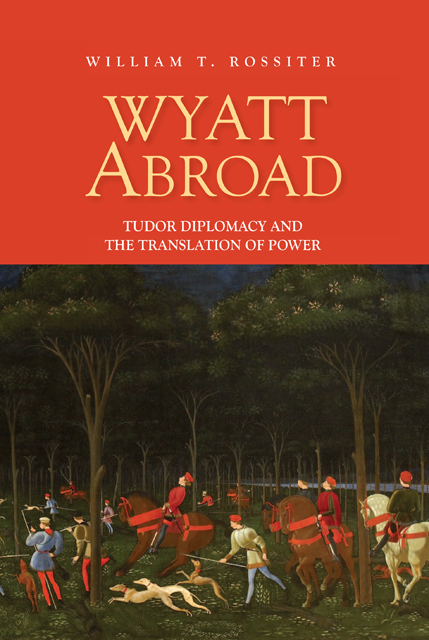Book contents
- Frontmatter
- Contents
- List of Illustrations
- Acknowledgements
- Note on Editions Used
- Abbreviations
- Introduction: The First Reformer?
- Chapter 1 ‘Sovendra du chaseur’: Wyatt in France, French at the English court
- Chapter 2 ‘My galy charged’: Wyatt in Italy
- Chapter 3 ‘So feble is the threde’: Wyatt in Spayne
- Chapter 4 ‘Inward Sion’: Wyatt in Jerusalem – The Penitential Psalms and Soteriological Diplomacy
- Conclusion: ‘In Kent and Christendome’: Wyatt in England
- Glossary of Rhetorical and Literary Terms
- Bibliography
- Index
Chapter 3 - ‘So feble is the threde’: Wyatt in Spayne
Published online by Cambridge University Press: 23 February 2023
- Frontmatter
- Contents
- List of Illustrations
- Acknowledgements
- Note on Editions Used
- Abbreviations
- Introduction: The First Reformer?
- Chapter 1 ‘Sovendra du chaseur’: Wyatt in France, French at the English court
- Chapter 2 ‘My galy charged’: Wyatt in Italy
- Chapter 3 ‘So feble is the threde’: Wyatt in Spayne
- Chapter 4 ‘Inward Sion’: Wyatt in Jerusalem – The Penitential Psalms and Soteriological Diplomacy
- Conclusion: ‘In Kent and Christendome’: Wyatt in England
- Glossary of Rhetorical and Literary Terms
- Bibliography
- Index
Summary
Back In Credit?
Less than a year after his release from prison following the execution of Anne Boleyn and her alleged lovers – those bloody days which broke his heart – Wyatt was appointed ambassador to the Imperial court of Charles V in March 1537. According to Edmund Bonner (Archdeacon of Leicester, later Bishop of London) and Simon Heynes (Dean of Exeter), who accused Wyatt of communicating with Cardinal Pole and wishing the king’s death in 1541, Wyatt had responded to his outrageous fortune by saying ‘Goddes bloud, the kinge sett me in the tower and afterward sent me for his embassadoure. Was not this, I praye you, a pretie way to get me credet?’ However, Wyatt denied ‘that [he] had spoken so lyke an Idiote’ and confirmed ‘that I neuer imputed to the kinges hyghenes my imprysonmente’, but rather blamed the Duke of Suffolk. The slanderers’ use of the paronomastic word ‘credet’ is interesting, as indeed ambassadorship was a costly business. Upon Wyatt’s suggestion that Henry cover some of these costs, Cromwell replied, on 29 November 1537, ‘I wold haue you in no wise to desire any such matier, it would be taken in yvel parte, and yet you shal neuer therin obteyn your purpose.’ Cromwell had promised in October 1537 to take care of Wyatt’s ‘dietts and post money’, and declared that ‘I shall be suche a ffreende vnto you, if nede require, as your enemyes, if you have any, shall wynne little at your hande in your absence.’ However, in the November letter Cromwell upbraided Wyatt, ‘for I haue not seen a wise man leave his thinges so rawlye, as yours be left’, and by April 1538 claimed that ‘I neuer saw man that had soo many Frendes here leave soo fewe perfite freendes behind him.’ Wyatt’s lavish expenditure was one of the charges laid against him by Bonner and Heynes, and led the French ambassador to England, Charles de Marillac, into the erroneous belief that Wyatt, ‘though neither Count nor Baron, was one of the richest gentlemen of England’. Yet the fact that Wyatt’s embassy followed so shortly after his imprisonment might not be considered a change of fortune, as Susan Brigden suggests: ‘Foreign embassy might be a kind of exile, a way of keeping political opponents away from court.
- Type
- Chapter
- Information
- Wyatt AbroadTudor Diplomacy and the Translation of Power, pp. 123 - 151Publisher: Boydell & BrewerPrint publication year: 2014

